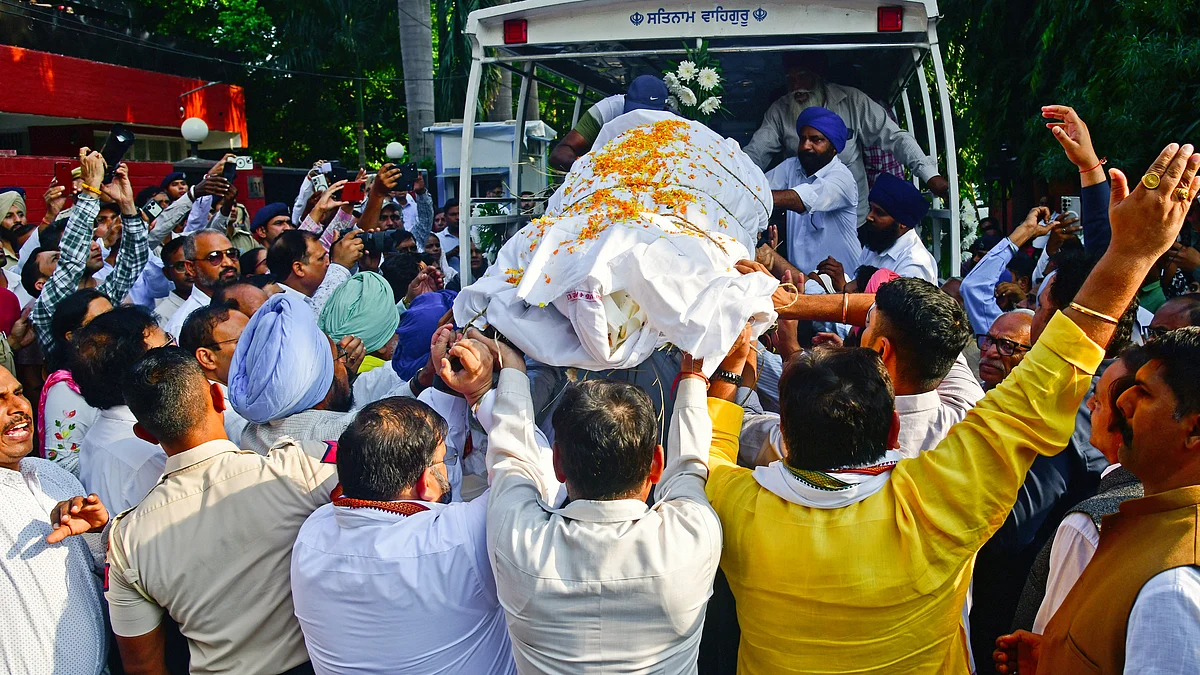Haryana IPS officer Puran Kumar cremated amid calls for impartial probe
Family demands justice amidst caste-bias allegations, more suicides, and deepening political tremors in Haryana

Eight days after his death sent shockwaves through the police and political establishment, senior Haryana IPS officer Y. Puran Kumar was cremated in Chandigarh on Wednesday. The 52-year-old, a 2001-batch IPS officer posted as inspector-general at the Police Training Centre in Rohtak’s Sunaria, allegedly died by suicide at his Sector 11 residence on 7 October, leaving behind an eight-page note accusing several senior colleagues of caste-based harassment and humiliation.
The cremation followed the completion of a postmortem at the Post Graduate Institute of Medical Education and Research (PGIMER), conducted under video supervision after a week-long delay. Emotional scenes unfolded at the Sector 25 cremation ground, where hundreds gathered to pay their last respects.
His wife, senior Haryana IAS officer Amneet P. Kumar, stood beside the couple’s two daughters and her brother, Punjab AAP MLA Amit Rattan, as the final rites were performed. The officer’s daughters lit the funeral pyre, while a police contingent presented a guard of honour.
Several political figures and senior bureaucrats were present at the cremation, reflecting the broad impact of the case. Among them were Haryana ministers Krishan Lal Panwar and Shyam Singh Rana, Punjab Assembly speaker Kultar Singh Sandhwan, Congress leader Pawan Kumar Bansal, and Haryana MLAs Ashok Arora, Pooja Chaudhry, and Nirmal Singh.
Senior officers, including chief secretary Anurag Rastogi, state DGP O.P. Singh, Chandigarh DGP Sagar Preet Hooda, and additional chief secretary (home) Sumita Misra, also paid their respects. Outside the cremation ground, mourners and activists raised slogans demanding justice and accountability.
The cremation came after days of deadlock over the postmortem, which the family had initially opposed. Amneet P. Kumar said she agreed to it only after receiving assurances from the Chandigarh Police and Haryana government that the process would be transparent and the investigation impartial.
“Considering the evidentiary importance of a timely postmortem and in the larger interest of justice, I have agreed for it to be carried out under the supervision of a magistrate, with videography to ensure full transparency,” she said in a statement. I have full faith in the Judiciary and the police authorities, and I hope the investigation will be conducted in a professional, time-bound manner so that the truth emerges and justice is served.”
The case has ignited a fierce debate over caste discrimination and workplace harassment within the state police. In his purported 'final note', Puran Kumar accused eight senior IPS officers of systematic caste-based humiliation, mental harassment, and professional marginalisation, alleging that he was repeatedly sidelined and mistreated because of his Dalit background.
The letter, now part of the ongoing investigation, has prompted demands for a judicial probe from Opposition parties and Dalit organisations. Critics say the episode highlights long-standing structural inequalities in the police service that are rarely acknowledged or addressed.
In the wake of public outrage, the Haryana government has sent DGP Shatrujeet Kapur on leave and transferred Rohtak SP Narendra Bijarniya, one of the officers named in the note.
The case took an unexpected turn on Tuesday when assistant sub-inspector (ASI) Sandeep Kumar allegedly shot himself dead, leaving behind a note that reportedly accused Puran Kumar of corruption. His death, coming amid the political and administrative upheaval, has complicated the investigation and raised questions about the broader circumstances surrounding both cases.
The Chandigarh Police Special Investigation Team (SIT) is now probing both deaths. Forensic experts and a ballistic specialist were present during Puran Kumar’s autopsy, which was videographed to preserve evidence.
The episode has rocked the Haryana government, with the Opposition accusing the BJP dispensation of failing to protect officers from workplace discrimination and internal bias. The decision to send the DGP on leave and transfer other senior officials is being viewed as a damage-control measure amid growing public anger.
“The fact that such a senior officer felt so cornered is deeply troubling,” said a retired IPS officer. “This incident reflects the urgent need to address institutional casteism and improve mental health support within the force.”
At the cremation ground, members of Dalit organisations and several citizens demanded a CBI probe, accusing the state government of shielding senior officers and delaying justice.
Colleagues described Puran Kumar as a dedicated and principled officer who maintained a quiet sense of duty throughout his two-decade career. He had served in diverse roles — from field postings to training and vigilance — and was known for mentoring younger officers.
His death has left the state police and bureaucracy grappling with introspection. “He was known for his integrity and calm leadership,” said a senior Haryana police officer. “If an officer of his standing felt so persecuted, it’s a wake-up call for the system.”
As the SIT continues its investigation, questions remain about the institutional culture that may have contributed to Puran Kumar’s death. The outcome of the probe will likely shape the debate over caste representation, mental health, and accountability in the Indian police system for months to come.
For now, the family’s plea is simple — truth and justice. “We have lost everything,” said a relative after the cremation. “But we will not stop until the truth comes out.”
With PTI inputs
Follow us on: Facebook, Twitter, Google News, Instagram
Join our official telegram channel (@nationalherald) and stay updated with the latest headlines
